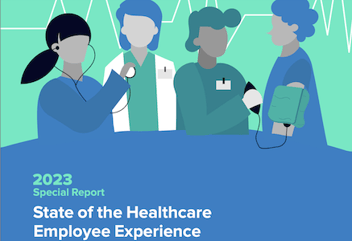Before we even get started diving into this report, let’s address the elephant in the room. Not everyone loves to call patients consumers. However, the fact is that while there are things that are unique to healthcare, everyone is a consumer. And health systems serve other groups besides patients–visitors, staff, etc. All the consumers you serve have expectations around experience. So don’t ignore data like that collected by Qualtrics.
According to the press release on Qualtrics Customer Experience Trends for 2024, Qualtrics asked over 28,000 consumers in 26 countries around the world about their expectations and what companies should do to win and keep their business. The findings reveal four key trends:
- Human connection is the foundation of a winning AI strategy
- Great service beats low prices in the battle for customer loyalty
- Digital support is the weakest link in your customer journey
- Consumers don’t give feedback like they used to, so companies must listen in new ways
So, how do these trends potentially impact healthcare? Let’s dive in and see.
AI and the human connection
The trend that is most clear as it relates to healthcare is that people still want a human connection even when AI is an option. Less than half (48%) of consumers are comfortable getting help from a chatbot or using AI-powered self-service. Generally, people are more comfortable using AI for transactional support. The higher the stakes, the less likely people are to want to engage with an AI Assistant or chatbot. There is a learning curve here and approaching with a plan to leverage AI where it makes sense while ensuring people can engage with a human when needed is critical.
Customer Service Wins
This is not the first time we’ve heard that a good or bad customer service experience can influence decisions even in healthcare. Over the past 10 years there have been other studies that suggest that even when the clinical care is good, a bad service experience can drive a patient to change providers. The same has been shown around out of pocket expense. Patients are willing to pay a bit more for great care and experience. So this finding is not surprising, even as it relates to healthcare. Never assume that great providers or clinical outcomes trump service and experience.
Digital Is Lagging
This one is also not a surprise as it related to healthcare experiences. The industry is well known for lagging behind other industries like finance, retail, and hospitality when it comes to digital experiences. “Digital channels, such as websites and apps, are becoming increasingly critical in shaping the customer experience,” said Moira Dorsey, Principal XM Catalyst, Qualtrics XM Institute in the report. “Brands that invest in improving the service and support they provide on their digital channels will pull ahead of the pack in customer retention and loyalty.” The report found that, “Despite being equally satisfied making a purchase online or in person, consumers are 2.7 times more likely to return if they had great digital support.” Other data has shown that patients are more likely to engage and keep coming back when a mobile app is available for them to access healthcare tools and information.
Getting Feedback Is Getting Harder
Honestly, this has always been true in healthcare. The holy grail is better feedback from patients to help shape their experience. According to the report, “Only a third of consumers give direct feedback every time they have a bad experience with a company, but they are providing feedback in less direct ways, such as in call center conversations, online chat, product reviews and social media posts.” Healthcare organizations are finding that they need to do more to get input from the people they serve–get out into the community, conduct focus groups, do other kinds of surveys like a simple NPS in a mobile app.
The expectations for a great service experience aren’t going anywhere. There is plenty in this report that can be applied to healthcare. You can download and read the entire 2024 Consumer Experience Trends Report for more information.


